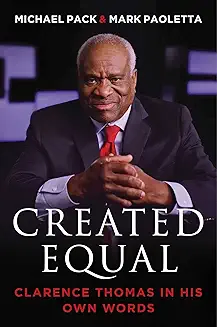
Justice Thomas’s judicial revolution bears fruit.

After Clarence Thomas’s bestselling 2007 autobiography, My Grandfather’s Son, followed by Michael and Gina Pack’s moving 2020 documentary, Created Equal: Clarence Thomas in His Own Words, in which the Justice tells the camera essentially the same story, what need is there for this new volume of selected transcripts from the film’s interviews, also called Created Equal: Clarence Thomas in His Own Words? Editors Michael Pack, the filmmaker who conducted the interviews, and Mark Paoletta, Thomas’s close friend and an ex-White House lawyer, write that most of the material is new, consisting of outtakes from the movie, but the life story recounted hasn’t changed. This book’s real novelty is the Justice’s discussion of jurisprudence, missing from the previous works, along with his reflections on social engineering and constitutional theory. These reflections are riveting, particularly after a Supreme Court term in which the judicial revolution—whose seeds Thomas has been sowing over his three decades on the Court—began to bear fruit in earnest.
In the Introduction, Paoletta rightly calls Thomas an American hero and our greatest Supreme Court Justice, and these pages detail the experience and thinking that formed so remarkable a judge. Remarkable, but also exemplary—both because Thomas believes that the Constitution’s central guarantee of liberty depends on the citizenry’s personal qualities of self-reliance and self-restraint, traits for which he is a poster child, and also because his own rise from poverty in the segregated Deep South to the High Bench illustrates the opportunity for self-development that liberty makes possible for Americans, both black and white. In particular, as he emphasizes in this volume, his story suggests what a different fate black America might have had if bad cultural developments and bad social policy, abetted by the Court, had not proved destructive to so many and led them to self-sabotage. Continue reading →


